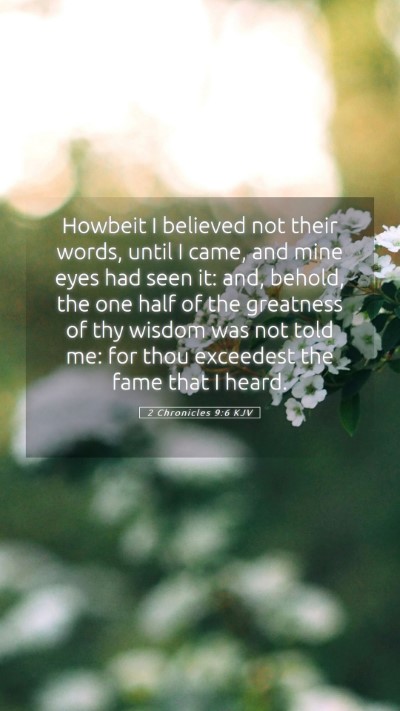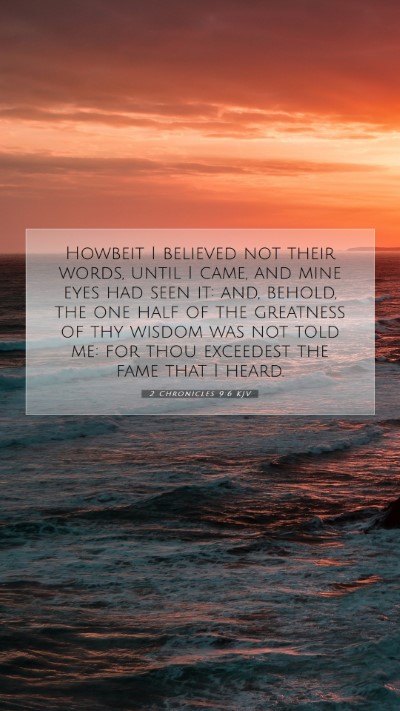Bible Verse Meaning: 2 Chronicles 9:6
Verse Reference: 2 Chronicles 9:6 – "And she said to the king, 'The report was true! I did not believe what they said until I came and saw with my own eyes. Indeed, half of the greatness of your wisdom was not told me. You have far exceeded the report I heard!'"
Overview of the Verse
This verse depicts the interaction between the Queen of Sheba and King Solomon, illustrating her astonishment at Solomon's wisdom and wealth. She had heard of his fame but found that it was even more pronounced in person. This moment serves as a testament to the great wisdom granted to Solomon by God, as well as a reflection on the nature of human wisdom and the pursuit of understanding.
Insights from Public Domain Commentaries
Matthew Henry's Commentary
Matthew Henry emphasizes the humility and openness of the Queen of Sheba. She travelled a significant distance to seek wisdom, demonstrating earnestness in her search for knowledge and truth. Henry notes that her reaction underscores the vastness of Solomon's wisdom, which was divinely granted, showcasing that worldly acclaim does not always match reality. This interaction becomes a powerful example of how wisdom can surpass human expectations.
Albert Barnes' Notes on the Bible
Albert Barnes points out the significance of the Queen's confession of her astonishment. He highlights her acknowledgment that her preconceived notions were far from the truth she experienced firsthand. Barnes elaborates on the idea that true wisdom and wealth are often understated. The subtext implies a divine endorsement of Solomon’s reign, as his wisdom draws seekers from distant lands, reinforcing biblical themes of God's favor upon Israel.
Adam Clarke's Commentary
Adam Clarke provides a thorough analysis of the cultural and historical context surrounding the Queen of Sheba. Clarke explains that her visit was not merely a diplomatic mission but also a spiritual quest. She represents the Gentile world recognizing the God-given wisdom in Israel. Clarke draws attention to the importance of personal experience in understanding truth, suggesting that what we hear must be verified through our encounters.
Lessons and Applications
- The Value of Personal Experience: Just as the Queen sought out Solomon to experience his wisdom directly, we are encouraged to seek a personal relationship with divine wisdom and understanding through Scripture.
- The Nature of True Wisdom: This verse exemplifies that true wisdom exceeds human definition. Wisdom from God transcends what we hear or expect, and often requires a journey of inquiry.
- Responding to Divine Evidence: The Queen’s acknowledgment of the greatness of Solomon's wisdom illustrates how we should respond to the evidence of God's work in our lives and the world around us.
- Impact of God’s Favor: Solomon’s reputation reflecting God’s favor invites us to consider how our actions and wisdom can positively influence others and draw them to seek God.
Related Biblical Cross References
- 1 Kings 10:1-3: The visit of the Queen of Sheba to King Solomon.
- Proverbs 3:13-18: The blessings of finding wisdom.
- James 3:17: Description of wisdom from above.
Conclusion
2 Chronicles 9:6 serves as a rich source of insight into the nature of wisdom and the recognition of God’s hand in the lives of those who seek truth. The Queen of Sheba’s declaration not only acknowledges the wisdom of Solomon but also invites us to deeper Bible verse understanding and biblical exegesis. In exploring this passage, we uncover layers of meaning that enhance our Bible study insights and encourage us to pursue a wise and faithful walk with God.
Recommended Bible Study Resources
- Online Bible study tools and courses for deeper understanding.
- Bible study groups focused on Old Testament insights.
- Guides that explore wisdom literature in the Bible.


